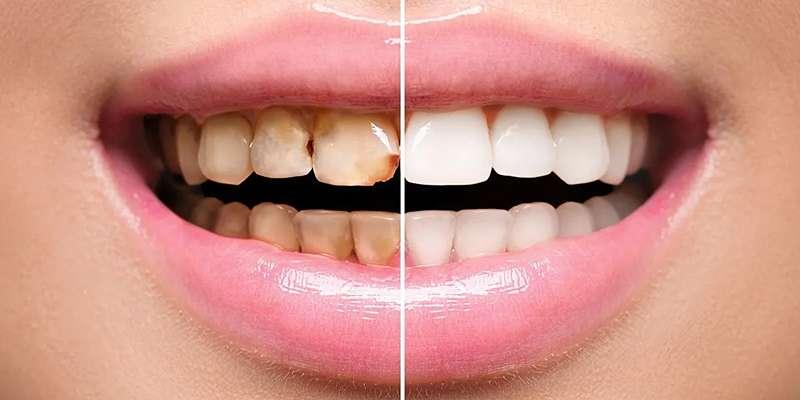If you’re considering dental veneers to help improve the appearance of your teeth and smile, there are several things to consider before making that decision. Veneers are a cosmetic solution for many people who want to boost their confidence by improving their smiles, but getting them requires careful planning and evaluation.
In this blog post, we will explore what it means to get dental veneers and why they may be right for you if you're willing to invest in yourself and your oral health. We'll also discuss the different types of veneers available and the factors that decide which will work best for your unique situation.
Finally, we'll look at how much it costs to get veneers from different dentists to maximize value while still achieving excellent results.
Different types of Dental Veneers

Dental veneers are tiny porcelain or composite resin shells that are affixed to the front of your teeth. They are utilised to strengthen and straighten the look of your teeth. Dental veneers come in a variety of forms, including conventional porcelain veneers, veneers that require little or no preparation, and no-prep veneers.
Traditional porcelain veneers are the most popular type of veneer, as they provide a natural-looking smile with excellent durability and longevity.
Minimal preparation veneers require minimal shaping of your existing teeth, allowing for faster treatment time than other options. No-prep veneers are the simplest and least invasive option, as they do not require any shaping of your teeth before being applied.
Finally, Lumineers are a type of veneer that uses a special material to help provide superior strength and durability compared to traditional veneers. No matter which type of veneer is chosen, you can trust that you will get a safe and effective solution to help improve your smile.
Research the costs of getting dental veneers.
Dental veneers are a popular cosmetic dentistry procedure that can help improve the appearance of your teeth.
Dental veneers can correct chips, stains, and other imperfections in teeth. The cost of dental veneers can vary significantly depending on the number of veneers you need, the type of material used, and your dentist's experience level.
Generally speaking, porcelain veneers tend to be more expensive than composite materials due to their durability and natural look. A single veneer typically costs $500 to $2,000, with the average cost per tooth around $1,200.
In addition to the cost of the veneers themselves, there may also be additional costs associated with getting dental veneers. These could include X-rays, impressions, anesthesia, and other preparatory procedures.
In some cases, your dental insurance may cover part of the cost of veneers, depending on your policy. Be sure to check with your provider to see if they offer coverage for this procedure. Lastly, it’s important to remember that while veneers are considered a relatively permanent procedure, they require some maintenance.
Regular visits to your dentist for cleanings and checkups can help ensure your veneers remain in good condition. Proper care and maintenance will also help extend the life of your veneers, making them a worthwhile investment in the long run.
Consult a dentist to determine if you are a good candidate for dental veneers.

Dental veneers may be a great option if you are looking for a way to improve the appearance of your smile's appearance. However, it is important to consult a dentist first to determine if this procedure is right for you. The dentist will evaluate your teeth and examine your medical history to make sure that veneers are an appropriate treatment.
The dentist will also discuss the different types of veneers available and take time to answer any questions you may have. This is important in ensuring you get the right type of veneers for your needs and situation.
Additionally, they can explain what to expect before, during, and after the procedure and discuss potential risks and side effects you should be aware of. Ultimately, consulting with a dentist is the best way to determine if dental veneers are right for you.
Benefits of Getting Dental Veneers
Dental veneers can offer several benefits to those looking to improve their smile. Here are some of the advantages that come with getting dental veneers:
• Improved appearance: Dental veneers can help hide imperfections such as chips, stains, and discolorations in teeth. This helps create a more uniform and attractive smile.
• Durability: Porcelain veneers are known for their durability and are resistant to staining from coffee, tea, and other foods.
• Easy maintenance: Dental veneers do not require special care or cleaning methods—they can be treated just like normal teeth.
• Comfort: Veneers are made to be thin and discreet, meaning they won’t cause any discomfort when eating or speaking.
Getting dental veneers can be a great way to improve the appearance of your teeth and give you the confidence to smile with pride. Talk to your dentist about what type of veneer is right for you, and research the costs associated with getting dental veneers.
Your new veneers can last many years with proper care and maintenance.
Potential Risks of Having Dental Veneers
Like any medical procedure, there are potential risks associated with getting dental veneers.
Here are some of the potential issues you may face when having veneers put on your teeth:
• Tooth sensitivity: Applying a veneer can cause temporary tooth sensitivity due to the removal of enamel during the preparation process.
• Damage to remaining teeth: When placing veneers, your dentist may have to remove some of the enamel on adjacent teeth to ensure a good fit. This can cause weakened or damaged teeth that may require additional treatment.
• Staining: Veneers are not entirely stain-proof and may discolor over time if not cared for properly.
• Poor fit: Improperly fitted veneers can cause gum irritation and discomfort. Getting a good fitting is important before having the veneer permanently bonded to your tooth.
• Allergic reactions: Some people may be allergic or sensitive to porcelain materials, so talk to your dentist about potential allergies.
It’s important to weigh the risks and benefits of getting dental veneers before deciding. Your dentist can help you decide if this procedure is right for you and guide you on the best material and care regimen.
FAQs
What are dental veneers?
In order to enhance the appearance of teeth, thin, custom-made shells called dental veneers are placed over their front surfaces. They can be created from porcelain or composite resin to correct dental problems like chipping, cracks, discolouration, misalignment, and gaps.
How do dental veneers work?
Dental veneers are placed over the existing teeth. They are made from a durable material and are carefully bonded to the tooth surface using dental cement. This creates a custom fit that looks and functions like natural teeth.
How long do dental veneers last?
The longevity of your veneers depends on several factors, such as the type of material used, how well you take care of them, and your oral hygiene habits. Generally, veneers can last 5 to 10 years with proper care and maintenance.
Conclusion
In conclusion, getting dental veneers is an important decision for anyone looking to improve the appearance of their teeth. Knowing what type of veneer will work best for your situation is essential as understanding how much it will cost. It all comes down to investing in yourself and your oral health.




